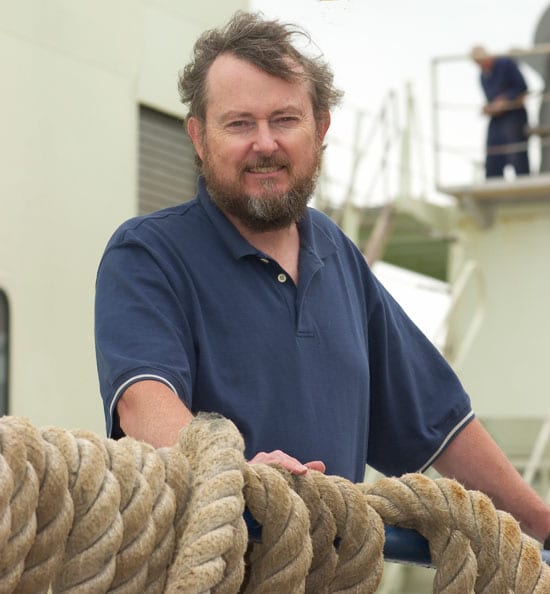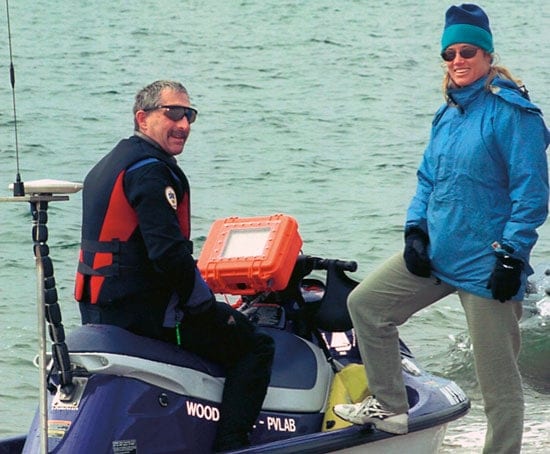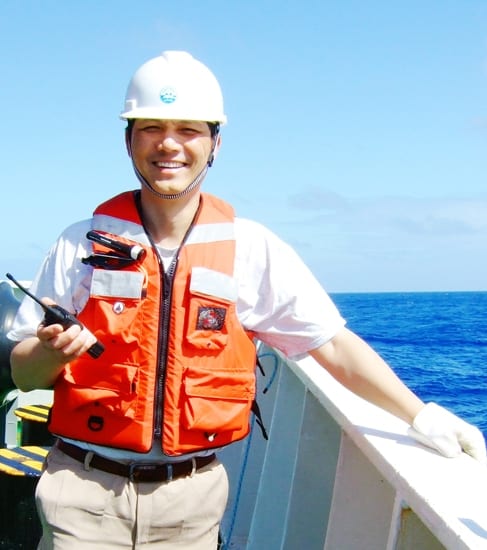News Releases
WHOI Team Aids Center for Coastal Studies in Whale Disentanglement
On Monday, May 4, a team of researchers from the Woods Hole Oceanographic Institution (WHOI) was working in the Great South Channel 40 miles east-southeast of Chatham, Mass., when they…
Read MoreResearchers Report Potential for “Moderately Large” Red Tide Outbreak in the Gulf of Maine Region for 2009
The potential for an outbreak of the phenomenon commonly called “red tide” is expected to be “moderately large” this spring and summer, according to researchers with the Woods Hole Oceanographic…
Read MoreJohn Toole Elected to the American Academy of Arts and Sciences
John Toole of the Woods Hole Oceanographic Institution (WHOI) has been elected a fellow of the American Academy of Arts and Sciences, one of the nation’s most esteemed honorary societies…
Read MoreThree Woods Hole Scientific Institutions Forge Alliance to Address Societal Issues
Three leading research centers based in Woods Hole, Massachusetts, announce the creation of the Woods Hole Consortium, a new alliance that will bring their combined scientific power to bear on…
Read MoreWHOI Announces Completion of Comprehensive Campaign
The Woods Hole Oceanographic Institution (WHOI) has successfully completed its “Depth of Leadership” campaign, the Institution’s Board of Trustees recently announced, with $194.6 million raised over the past nine years.…
Read MorePolar Discovery Online Expedition Brings Arctic Experience to Virtual Explorers
Beginning April 4, students, teachers, museum visitors, and virtual explorers can join a multi-institutional team of researchers led by Carin Ashjian of the Woods Hole Oceanographic Institution (WHOI) on a…
Read MoreDeep Sea Floor Mining Is Subject of International Colloquium at WHOI
Scientists, policymakers, environmentalists, and industry representatives will gather next week at Woods Hole Oceanographic Institution (WHOI) to discuss the issue of mining precious metals from the seafloor. A public colloquium,…
Read MoreYou Don’t Call, You Don’t Write: Connectivity in Marine Fish Populations
Children of baby boomers aren’t the only ones who have taken to setting up home far from where their parents live. A new study published this week in the Proceedings…
Read MoreElgar Named National Security Science and Engineering Faculty Fellow
Steve Elgar, a senior scientist in the Woods Hole Oceanographic Institution (WHOI) Applied Ocean Physics and Engineering department, was recently named a 2009 National Security Science and Engineering Faculty Fellow…
Read MoreWarming Climate Impacts Base of Food Web in Western Antarctic Peninsula
A paper published this week in Science shows for the first time that the warming climate is changing the numbers and composition of phytoplankton—the base of the food web—along the…
Read MoreRight whale sedation enables disentanglement effort
On Friday, March 6, 2009, for the first time ever, a North Atlantic right whale that had been severely entangled in fishing gear, was administered a sedation mixture that made…
Read MoreAirborne pollutants can be toxic to marine algae
A newly published paper by ocean scientists shows that airborne particles off the continents can have deadly effect on some marine phytoplankton. The findings, published in the online early edition…
Read MoreWHOI and RTDC Announce Technology Transfer Partnership
The Woods Hole Oceanographic Institution (WHOI) and the Regional Technology Development Corp. (RTDC) of Cape Cod announced jointly today the signing of a technology transfer and entrepreneurial services agreement designed…
Read MoreCarbon Acts Like Rustoleum Around Hydrothermal Vents
The cycling of iron throughout the oceans has been an area of intense research for the last two decades. Oceanographers have spent a lot of time studying what has been…
Read MorePhytoplankton Cell Membranes Challenge Fundamentals of Biochemistry
Get ready to send the biology textbooks back to the printer. In a new paper published in Nature, Benjamin Van Mooy, a geochemist with the Woods Hole Oceanographic Institution (WHOI),…
Read MoreOcean Islands Fuel Productivity and Carbon Sequestration Through Natural Iron Fertilization
An experiment to study the effects of naturally deposited iron in the Southern Ocean has filled in a key piece of the puzzle surrounding iron’s role in locking atmospheric carbon…
Read MoreEmperor Penguins March toward Extinction?
Popularized by the 2005 movie “March of the Penguins,” emperor penguins could be headed toward extinction in at least part of their range before the end of the century, according…
Read MoreDanube Delta Holds Answers to Noah’s Flood Debate
Did a catastrophic flood of biblical proportions drown the shores of the Black Sea 9,500 years ago, wiping out early Neolithic settlements around its perimeter? A geologist with the Woods…
Read MoreBacterial Pathogens and Rising Temperatures Threaten Coral Health
Coral reefs around the world are in serious trouble from pollution, over-fishing, climate change and more. The last thing they need is an infection. But that’s exactly what yellow band…
Read MoreMedia Advisory: Turtle Skulls Prove to be Shock-Resistant
Scientists and engineers from Woods Hole Oceanographic Institution (WHOI) and the U.S. Navy have discovered that sea turtles’ skulls and shells not only protect them from predators but also from…
Read MoreStudy links swings in North Atlantic Oscillation variability to climate warming
Using a 218-year-long temperature record from a Bermuda brain coral, researchers at the Woods Hole Oceanographic Institution (WHOI) have created the first marine-based reconstruction showing the long-term behavior of one…
Read MoreWHOI Physical Oceanographer Joe Pedlosky to Present Haurwitz Lecture at American Meteorological Society Meeting
Joseph Pedlosky, a physical oceanographer with the Woods Hole Oceanographic Institution, has been awarded the Bernhard Haurwitz Memorial Lectureship at the American Metrological Society’s 89th Annual Meeting in Phoenix, Arizona,…
Read MoreSurprising Return of North Atlantic Circulation Pump
One of the “pumps” contributing to the ocean’s global circulation suddenly switched on again last winter for the first time this decade, scientists reported Tuesday (Dec. 23) in Nature Geoscience.…
Read MoreJian Lin Named a Fellow of the American Association for the Advancement of Science
Jian Lin of the Woods Hole Oceanographic Institution (WHOI) has been named a fellow of the American Association for the Advancement of Science (AAAS). Election as a fellow is an…
Read More


